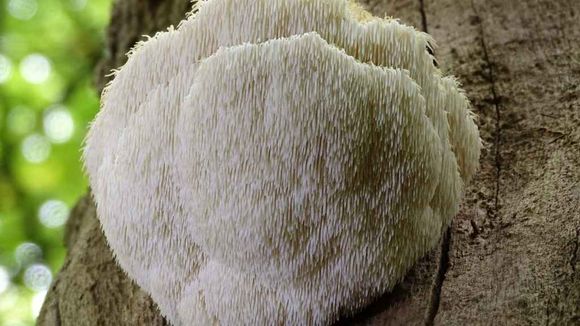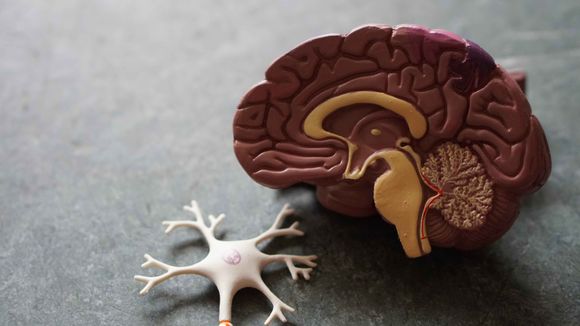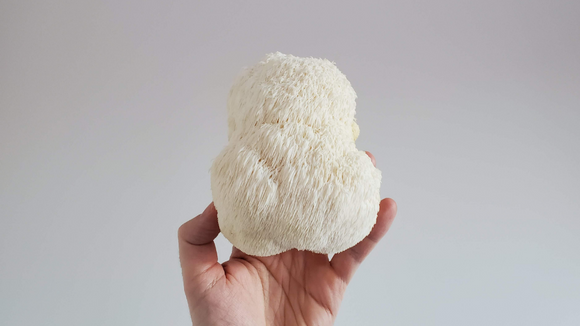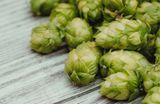What are Lion's Mane mushrooms (Hericium erinaceus)?
The lion's mane mushroom is first of all an edible mushroom, otherwise we would not write about it in such a context. And despite its fearsome name in our native language, Hericium erinaceus has irrefutable nicknames in other countries around the world. In Japan, it is known as Yamabushitake or "mushroom mountain monk". This is because the Buddhist monks of Yamabushi wear "suzukake" or a garment with long strands of hair or fur, Which resembles the mushroom. In China, it's Ho Tou Gu, the "monkey-headed mushroom." 1
The shaggy appearance of the lion's mane also won him titles such as:
- Mushroom bearded tooth
- Mushroom bearded hedgehog
- Satir's beard
- Mushroom pompom and other even more attractive.
All of these names point to the unique orb shape characteristic of lion's mane mushrooms, making them easy to recognize in the wild, at farmers' markets, or on the rare occasions when found elsewhere.
Like the reishi mushroom, lion's mane has been used for medicinal purposes for thousands of years (2000 BC, to be exact). In both Chinese and Japanese medicine, lion's mane "has traditionally been used to strengthen the spleen, nourish the intestines, and also as an anticancer drug."
But what really makes lion's mane stand out from other mushrooms (aside from the fact that it looks like a lion's lush mane and tastes like crab or lobster), it's a natural nootropic. This means that it can naturally improve cognitive function. 2
How the Lion's Mane mushroom works - active ingredients

Lion's mane contains various functional compounds, but two are the main substances that stand out:
- Aromatic Hericenones
- Dieterpenoid erinacins
No other food contains this powerful combination, which makes lion's mane exceptional.
The chemical structures of these compounds are somewhat complex. Aromatics consist of loops bonded by covalent bonds (shared electrons). This adds a measure of stability known as aromaticity, hence the name.
Diterpenes - naturally produced from plants, animals and fungi - have four isoprene units. Isoprene consists of two or more hydrocarbon units with a specific arrangement of carbon atoms.
Neerinacin diterpenoids are found in other medicinal mushrooms and exhibit both antimicrobial and anti-inflammatory activity. But erinacins can do something unusual that non-erinacins cannot: cross the blood-brain barrier. (Hericenons may share this ability; but further study is needed for confirmation.) This hidden superpower is what gives the lion's mane mushroom its beneficial effect on the brain.
The fruiting bodies of lion's mane contain two compounds that are called erinacin A and B. Both erinacins have been shown to promote nerve growth factor (NGF) synthesis, which has potential applications in dealing with multiple neurological conditions and disabilities. 3
To date, more than 70 compounds have been identified in Hericium erinaceus. It's possible that this new data could help unravel some of the mysteries behind the lion's mane's incredible potential. 4
General benefits of using lion's mane
Traditionally used to combat digestive disorders and stomach problems, the lion's mane mushroom has also been recognized as a restorative for overall health to support immunity and cognitive function.
It is believed that the healing, regenerative nature of lion's mane helps to maintain the optimal condition of:
- Liver
- Spleen
- Heart
- Lungs
- Kidneys
Any "deficiency" in the body — thought to manifest externally with symptoms such as insomnia, weakness, and loss of strength — can be addressed with the help of Hericium erinaceus.
Of course, lion's mane also has a long tradition of use for brain health. Some cultures recognize the fungus as an aid to memory, concentration, and overall mental function; Others point to the lion's mane mushroom to support nerve growth and repair, as well as for more clarity and focus.
Seven scientifically based benefits of lion's mane mushrooms
Protection against dementia and Alzheimer's disease

One of the most impressive benefits of lion's mane mushrooms is that they can protect against dementia and Alzheimer's disease. Studies have shown that lion's mane can improve cognitive function and memory in people with mild to moderate forms of these diseases. Alzheimer's disease is the most common form of dementia, affecting at least 50 million people. Dementia is a general term used to describe the deterioration of mental functions that occurs with age. Symptoms may include memory loss, difficulty reasoning and problem solving, confusion, and changes in mood or behavior.
Lion's mane contains compounds known as hericistins and erinacins, which have been shown to promote nerve growth and protect neurons from damage.
The unique ability of erinacins to cross the blood-brain barrier and promote regenerative activity in the brain is the most important advantage of the lion's mane mushroom. Here it is important to explain more about the so-called. nerve growth factor (NGF).
Nerve growth factor functions exactly as the name suggests: it regulates the growth and reproduction of nerve cells, supports cellular health, and prevents cell death. NGF is part of a family of molecules known as neurotrophic factors that support both mature and developing neurons.
Neurotrophic factors allow the brain to heal and repair itself after an injury and maintain what's known as "brain neuroplasticity" throughout life. In other words, your brain never stops responding to information, thought patterns, and external stimuli, and NGF helps strengthen or even create important neural pathways in the brain.
Studies in people with dementia for the use of lion's mane
Problems with cognition can arise when the brain fails to cope with the growth and formation of new connections as we age. The resulting cognitive decline can manifest as varying degrees of memory loss or dementia. Several studies have shown the potential of lion's mane for dementia prevention and cognitive support.
In one of them, a group of 30 adults with "mild cognitive impairment" were divided into two groups and given either lion's mane or placebo. Those who took lion's mane supplements performed better on cognitive tests at weeks 8, 12 and 16 of the study. 5
In studies on PC12 cells — used to study brain health and function — lion's mane appeared to prevent damage and reduce the occurrence of cell death.
Even in healthy subjects, mushroom supplementation can improve the ability to recognize and recall previously learned information ("recognition memory") by exercising activity similar to brain-derived neurotrophic factor (BDNF). BDNF supports the plasticity of neurons, making learning, memorization and cognitive processes easier to run. 6
Studies in people with Alzheimer's for the use of lion's mane
Currently, no human studies have been conducted to investigate the effects of Hericium erinaceus on Alzheimer's patients. In studies on mice, however, mushroom extracts were able to reduce symptoms of memory loss and prevent the accumulation of beta-amyloid (β-amyloid) plaques. Since the accumulation of β-amyloid plaques is a key factor in the development of Alzheimer's disease, this activity can have significant implications for the prevention or even treatment of the disease.
Relieving symptoms of anxiety and depression
Lion's mane isn't just a strength for memory — it can also help your mood. Hericium erinaceus extracts appear to regenerate cells in the hippocampus, the area of the brain responsible for emotional response and memories. In a mouse model, the fungus shows the potential to support neurogenesis, the process of growing new nerve cells.
The practical daily benefit of all this can be seen in studies related to anxiety and depression. A four-week study involving a group of 30 postmenopausal women found that cookies made with lion's mane were better than placebo cookies at reducing anxiety and irritability. 7
Lion's mane extracts have been shown to block the signaling power of nuclear factor-kappa beta (NF-kB), a protein complex responsible for promoting inflammation by inducing synthesis of pro-inflammatory compounds. The fungus may also reduce elevated levels of two pro-inflammatory cytokines, known as IL-6 and TNF-alpha.
Recovery Benefits from Nervous System Injuries
The brain, spinal cord and other nerves that travel around the body are part of the nervous system. These elements collaborate to transmit and exchange messages that control almost all bodily functions. Injuries to the brain or spinal cord can be fatal. They often lead to paralysis or loss of mental abilities, and the recovery time is long.
However, lion's mane mushroom extract has been shown in studies to promote the growth and repair of nerve cells, which may help in recovering from this type of injury. Lion's mane extract may also help reduce the severity of brain damage after a stroke.
In one study, high doses of lion's mane mushroom extract given to rats immediately after a stroke helped reduce inflammation and reduce the size of stroke-related brain damage by 44%.
Improved protection against ulcers in the digestive tract

Stomach ulcers are usually a consequence of two main factors: overgrowth of H. pylori and damage to the gastric mucosa caused by long-term use of nonsteroidal anti-inflammatory drugs (NSAIDs).
Lion mane extract, when taken correctly, has been found to protect against the development of stomach ulcers by inhibiting the growth of H. pylori and protecting the gastric mucosa from damage. This was attributed to a polysaccharide fraction isolated from a mycelial culture of the medical fungus.
Anti-inflammatory action and reduction of oxidative stress
The lion's mane mushroom contains powerful anti-inflammatory and antioxidant chemicals that can help manage inflammatory conditions. In fact, one study comparing the antioxidant abilities of 14 different species of mushrooms found that lion's mane had the fourth highest antioxidant activity.
In rats, lion's mane extract reduces inflammation and indicators of oxidative stress, suggesting it may be particularly useful in the treatment of inflammatory bowel disease, liver damage and stroke. It is necessary to investigate whether it has the same effect in humans in larger studies.
Anti-cancer action of the mushroom Lion's mane
When lion's mane extract combines with human cancer cells in a test tube, it causes cancer cells to die at a faster rate. This is seen in many types of cancer cells, including tumors of the liver, colon, stomach and blood. 8
In another study, we find that diterpene shows good cytotoxic activity against two human cancer cell lines - K562, LANCAP and HEP2. 9
Antioxidant power and skin protection with Lion's Mane mushrooms
When the body is stressed or exposed to chemicals — whether in the environment or food — compounds known as free radicals are formed. Antioxidants like those found in lion's mane have the ability to "donate" electrons to free radicals, which neutralizes compounds while protecting healthy cells. The result is less inflammation and a lower risk of cell damage.
According to research, lion's mane may have specific benefits associated with this anti-inflammatory activity, including:
- Reduce skin aging by increasing levels of skin antioxidants and collagen proteins
- Reduce prooxidant reactive oxygen species and increase antioxidant levels in the brain
- An increase in antioxidants and a decrease in lipid peroxidation in diabetic rat models, suggesting potential applications for the management of diabetic neuropathy.









